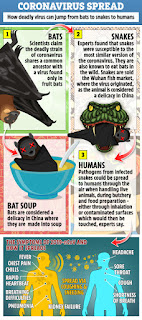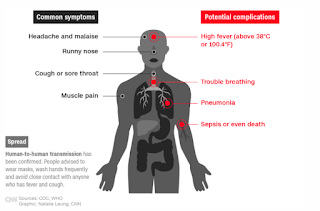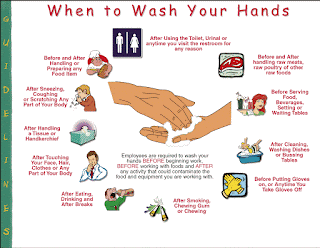Article Written: February 28, 2020
By Sean Overpeck (CFE)
**A full article and index glossary of restaurants, wines, recipes and travel for
Wine Dine and Play are in the pages section above, or by following these links:
Take a good look at the picture above. You see several food service workers in an Asian restaurant preparing dim-sum pastries and all of them are wearing face masks to prevent coughing on the food, equipment, or each other. Now the dim-sum will be boiled to a high temperature to kill any virus spores, so this food is hopefully safe. Look closer at their hands as they prepare the dumplings. They are not wearing single-use food safety gloves. Did they wash their hands after using the bathroom, touching an unclean surface, rubbing their eyes? Can coronavirus spread through food, specifically ready to eat foods, or handling plates and cutlery without proper hygiene? Yes.
The coronavirus or Covid-19 which began at a food market in the city of Wuhan, Hubei province, China in December 2019 has now spread to over 50 countries on 6 continents. There are over 84,000 cases with nearly 3000 deaths. The largest clusters outside of China are in Italy, South Korea, and a very scary and dangerous situation in Iran where the Health Minister and now the countries Vice President have fallen ill. Many other countries are receiving their first cases from travelers returning from Iran. The situation is very close to becoming a worldwide pandemic. The main way that the virus is transmitted is through smear infection which is the transmission of pathogens by direct contact with an infected person (direct contact infection) or indirectly by touching contaminated objects (indirect contact infection) that they may have touched, coughed, or sneezed on. For now, airborne transmission has not been seen beyond a few feet from smear infection. According to Philip Tierno, Professor of Microbiology and Pathology at the NYU School of Medicine, coronavirus can survive up to 9-days on an inanimate object.
So can coronavirus be spread through food? The answer according to the Federal Ministry of food and Agriculture (BMEL), and medical staff, is that there have not been any reported cases transmitted in this fashion, yet but yes it is possible. Before the coronavirus and long after — there will be foodborne illnesses that result in 128,000 hospitalizations and 3,000 deaths each year. According to the FDA, CDC, and scientists at USAMRID, the (U.S. Army Medical Research Institute of Infectious Diseases), there are over forty types of biological contaminants out there that can spread to humans through food, and six have been singled out as highly contagious such as norovirus. A perfect example of this was in Pyeongchang, South Korea during the 2018 Winter Olympic games. According to the Centers for Disease Control in Atlanta, Georgia some 685 million cases of norovirus per year are reported. The Chinese Center for Disease Control and Prevention researchers managed to isolate live coronavirus from stool samples of Covid-19 patients. And they’re not the first to find the virus in human stool. The method of transmission is possible through what is known as the “fecal-oral” route of disease transmission.
<!-- Wine Dine and Play Adds —>
The coronavirus outbreak is affecting food in three major ways. The first is the effect on the supply chain, then there is the economic effect of people not dining out, and finally is the fear that coronavirus can be spread through food like other common foodborne illnesses mentioned above and others such as shigella and e-coli. Remember that you don’t have to dine out to get sick from foodborne illness. More people get sick at home then they do dining out. The Coronavirus' Impact on the Chinese Food Industry sectors is falling weekly from $31 billion to $124 billion, according to Rabobank. In the epicenter of the virus, more than 300 Chinese companies are already seeking bank loans totaling at least $8.2 billion to help soften the impact of the coronavirus outbreak, according to two banking sources, reported by Reuters on February 10, 2020.
BMEL in Germany does not know if imported foods from areas affected can be transmitted to humans. According to BFR ( Bundesinstitut für Risikobewertung) due to the transmission methods recorded thus far, and the relatively low environmental stability of coronaviruses, it is unlikely that imported goods such as imported foods may be sources of infection. Droplet infection is still the most common form of spreading, so if someone sneezes or coughs on produce, and you do not properly wash it, then it is possible to spread if consumed.
According to the Food Safety Authority of Ireland from the experience with SARS and MERS, people were not infected with the virus through food. So, it is unlikely the virus is passed on through food and there is no evidence yet of this happening with COVID-19 to date, but it can. Coronaviruses need a host (animal or human) to grow in and cannot grow in food. However, the virus can be transmitted by food when the food is contaminated. If a food service worker does not know that he or she has coronavirus and is asymptomatic, uses the bathroom and fails to properly wash their hands then returns to the kitchen to work, they can pass on the coronavirus to their customers when they touch ready-to-eat foods. There’s some suggestion in the emerging literature that Covid-19 could be passed through exposure to virus-laden feces.
If you are home and you do not properly wash your hands, you can pass on any foodborne illness to include the coronavirus. Hot-pots, or steamboats, is a common and popular food that is eaten across Asia, where groups of people come together to cook their food in a communal pot of hot broth.
According to World of Buzz A group of five friends who visited a popular chain of hotpot restaurants in Jiangsu, China, unfortunately, after having their meal together, two of the three friends contracted the novel coronavirus. Aerosol transmission, according to a senior physician, could be the reason why this group of friends managed to catch the novel coronavirus. But this and other food-related transmissions of the virus, spread by lack of hygiene is not being ruled out. A home Hot Pot gathering in Hong Kong resulted in a cluster of cases, and the many people bringing food and cooking it in an enclosed area without properly washing fresh fruits and vegetables or washing hands helped spread the disease. Poop was also implicated in the first SARS outbreak in 2003 when a large housing estate in Hong Kong called Amoy Gardens became ground zero of a public health nightmare. More than 300 people were infected with the disease through yet another viral transmission route: airborne transmission of virus-ridden feces aerosols.
<!-- Wine Dine and Play Adds —>
Handwashing can help prevent illness. It involves five simple and effective steps (Wet, Lather, Scrub, Rinse, Dry) you can take to reduce the spread of diarrheal and respiratory illness to include coronavirus. Regular handwashing, particularly before and after certain activities, is one of the best ways to remove germs, avoid getting sick, and prevent the spread of germs to others. According to (FSANZ) - Food Standards Australia New Zealand everyone should practice good hygiene and other measures to protect against infections.
The World Health Organization (WHO) advises people to:
- wash hands regularly
- cover your mouth and nose when coughing and sneezing
- thoroughly cook meat and eggs
- avoid close contact with anyone showing symptoms of respiratory illness, such as coughing and sneezing
- Avoid touching your eyes, nose, and mouth
- Stay home when you are sick.
- Cover your cough or sneeze with a tissue, then throw the tissue in the trash
- Clean and disinfect frequently touched objects and surfaces using a regular household cleaning spray or wipe. Good hygiene and sanitation are important to avoid cross-contamination between raw or undercooked foods and cooked or ready to eat foods in the kitchen
As an added precaution, if you have suspected symptoms of respiratory illness you should avoid preparing food for other people and seek medical attention.
What can food workers do?
It is possible that infected food workers could introduce the coronavirus to the food they are working on by coughing and sneezing, or through hand contact unless they strictly follow good personal hygiene practices. The World Health Organization says yes and advises those standard recommendations to reduce exposure to and transmission of a range of illnesses are maintained.
These include:
- proper hand hygiene
- cough/cold hygiene practices
- safe food practices
- avoiding close contact, when possible, with anyone showing symptoms of respiratory illness such as coughing and sneezing
Food workers must wash hands:
- before starting work
- before handling cooked or ready-to-eat food
- after handling or preparing raw food
- after handling waste
- after cleaning duties
- after using the toilet
- after blowing nose, sneezing or coughing
- after eating drinking or smoking
- after handling money
Why is handwashing important?
Hand washing is vital in preventing contamination of food by food handlers. Harmful bacteria such as E. coli, Salmonella and Staphylococcus aureus and viruses (norovirus, coronavirus, etc.) present on food workers or anyone's hands are removed and killed by proper handwashing techniques.
- Why is handwashing important?
- How often should food workers wash their hands?
- Is handwashing necessary if gloves are used when handling food?
- What is the proper handwashing technique?
- How hot should the water be for handwashing?
- Should separate sinks be provided for handwashing?
- What should be provided for washing and drying hands at the hand washing sinks?
- Is it a legal requirement to use antibacterial soap, antiseptic wipes or disinfectants?
- Are gloves a legal requirement for workers handling food?
- Is it a legal requirement to wear gloves when handling raw food?
- Where can I find more information?
WHY
There are many people in the world that DO NOT practice good hygiene and it is those people that spread disease the most. They will finish there business, turn on the faucet to throw water into their mouths and gargle, turn the faucet off, and walk out the door, leaving their feces on the faucet handle, along with the exit door.
What can food business owners/managers do?
However, food business owners (FBOs) have particular responsibilities under food law. FBOs have an important role to play in preventing foodborne illness.
They should:
- Ensure that staff are aware of the COVID-19 (coronavirus) situation
- Ensure that staff are trained appropriately in food hygiene
- Ensure effective supervision of staff to reinforce hygienic practices
- Provide the correct facilities e.g. hand washing, toilets, to enable staff to practice good hygiene
- Ensure staff and contractors report any physical signs/symptoms, before commencing work or while in the workplace.
- Keep vigilant and ensure that staff are not ill and are fit to work
According to the Business Insider, the coronavirus is dramatically changing food consumption in China. Meituan is a major food delivery company in China, and they are seeing a dramatic change in customers' food consumption in the wake of the deadly coronavirus. The company piloted a contactless delivery service after the outbreak began. According to Meituan, which has 5.9 million partner retailers and 700,000 daily active couriers, more than 80% of all orders made between January 26 and February 8 requested the contactless delivery service. And in the epicenter of the virus outbreak, Wuhan, that figure rose to 95.1%. When the virus makes its way to the United States GrubHub, UBER Eats and other food delivery companies will begin to see the same types of increased business. While in China food delivery is generally considered to be for those who eat alone, the company is witnessing a significant increase in orders meant for more than one person. Other major delivery providers like Ele.me and chains like KFC launched similar services in China after that.
Other noteworthy food articles, travel, and restaurants similar to this article:
2019 World’s Best Restaurants From the San Pellegrino’s top 50 + 51-120 best.
2018 World’s Best Restaurants The San Pellegrino’s list of the top 50 is reviewed
A Taste of Dubai - The Oasis of Luxury I began dining in Dubai in 2009. This article covers the food scene and tourism (article coming soon)
Afghanistan Travel, recipes + food, culture, turbulent history and more - A culinary tour of Afghanistan during the war
Beef Recall Rancho Feeding Corp. Recall from February 2014
Bordeaux - A Sip and Taste Wine tours and restaurants in Bordeaux, France
Burj Khalifa Tower Take a tour of the tallest building in the world, Dubai, UAE
Codes on Fruit An article on the grocery store FFV codes and what they mean
Converting A Recipe Card From Imperial To Metric Cooking conversions made easy
Craft Beer Experience 2018 sponsored by 97X Radio featured over 52 Craft Breweries at the Mahaffey Theater in St. Petersburg, Florida.
Dragon-Con 2008 Yearly science fiction convention at the Hyatt, Hilton and other Hotels, Atlanta Georgia
Jungle Prada Site and Anderson/Narvaez Mound A historical Discovery Florida Toured Indian site in St. Petersburg, Florida
Leopard Hills Lodge Safari’s with contemporary African cuisine in Sabi Sand Game Reserve, South Africa
LTI Top London Restaurants A luxury travel listing of their best-rated restaurants
Napa - A Sip and Taste in Wine County A 3-day tour of wineries and fine dining restaurants in Napa County, California
Netflix Movie Codes search for your favorites
Pretty in Pink - Carbon Monoxide in Meat Why is meat so red? What are you really eating?
Row 11 Red Wine Demi-Glace Classic French mother sauce prepared with a California Pinot Noir
Shark Cage Diving Adventure with the Great White Shark Tours company in Gansbaai, South Africa
Sparkman’s Wharf An outdoor Channelside venue with a beer garden, coffeehouse, and 10+ restaurants in Tampa, Florida
Sydney Wine Tasting Yearly tasting event at Hyde Park in Sydney Australia
The Bourgogne Tasting A tasting of the Vougeot AOC, caves, and the Hospices de Beaune tour
The Complete A to Z Food and Beverage Grand Dictionary If you're looking for it, then you just found it
The Yarra Valley Tasting A tasting and dining with traditional Australian food and wine, not Yellowtail or Outback Steakhouse (article coming soon)
Tipping in Restaurants Etiquette, customs, cultures, and assumptions are explored
United States Marine Corps Birthday 2013 at the US Consulate in Herat, Afghanistan
What is a Restaurant Review? Dig back into the history of what restaurant awards and reviews are about and how we became so obsessed with it
** Wine Dine And Play’s Top 100 Best Restaurants A list focused on travels and the best dining experiences from around the world. **
****
The world’s best restaurants is a subjective list of who is writing it and changes on a regular basis. The Wine Dine and Play best experiences are based on my highest rated stared restaurants, meaning that the visit was an outstanding or extraordinary experience. From cafés, chains, mom + pops, hole in the walls, to fine dining including a few Michelin spots. Visit the Top 100 page to see the entire list.
A few to tease you with…
|
French-American Fine Dining
Yountville, California, USA
|
Elegant Modern Australian with Molecular Gastronomic
Melbourne, Australia
|
Acclaimed high-concept inspired Farm to Table tavern
Charleston, South Carolina, USA
|
“Culinary perfection consists not in doing extraordinary things,
But in doing ordinary things extraordinarily well.”
-Angelique Arnauld (1591-1661)
Who is John Galt?
TTFN
<!-- Wine Dine and Play Adds —>











